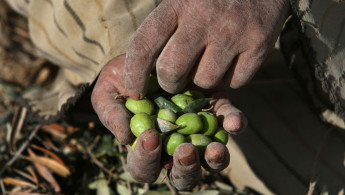Palestinian chefs make culinary art from bold, brave flavours
The eight chefs visited restaurants in Ramallah, Hebron, Nablus and east Jerusalem in a week-long event earlier this month sponsored by the French government.
Bold and brave
Palestinian cooking is steeped in local and Middle Eastern traditions, which makes the most of fresh ingredients thanks to a strong agrarian tradition and a shortage of clientele with disposable income.
This includes dishes lean on chickpeas, lentils and rice, often spiced with cumin, drizzled in olive oil and accompanied by sides like hummus, tabbouleh and yogurt.
Palestinian food also draws on Levantine flavours like zaatar, as well as sumac and pomegranate molasses.
Ramallah, seat of the Palestinian Authority, has seen dozens of new restaurants and cafes open in recent years, serving local and international fare.
This includes Caesar Hotel, which opened five years ago.
"Someone wanted to work for us after he came from a construction site. Another one dropped out of high school," said Jamal Nimer said speaking about the trend of Palestinian chefs learning their trade on the job.
"You have to teach the people how to work," he added.
One of the visiting French chefs gave lessons to the 32 Palestinian students on baking bread, cakes and macaron cookies at the Caesar Hospitality College in Ramallah, which Nimer opened earlier this year to train staff.
Michelin star cuisine
At the nearby Orjuwan restaurant, co-owner Saleem Sakakini said visiting chef Alex Dreyer helped his staff master basic but essential techniques for French cuisine.
Students were soon preparing a special menu featuring salmon in hollandaise sauce, a lamb rack served over herb-infused mashed potatoes and an apple tarte tatin.
 |
| A Palestinian chef prepares a dish of hummus and falafel [Getty] |
"I liked the Palestinian food, because I think it's a very specific flavour that anyone can enjoy," said Dreyer, who works as a chef in Paris.
"The flavour is so bold and beautiful," he added.
Sakakini said he was grateful his dozen kitchen staff could get a master class in using the "sous vide" appliance, which cooks meat or vegetables uniformly via a hot water bath.
He also relished the small touches Dreyer introduced.
"He poached sliced garlic in milk for two hours, then dried it and then deep fried it," Sakakini said. "And then used it as a garnish. They looked phenomenal. I never tried this before."
In the southern West Bank town of Hebron, Mahmoud Halaika worked with Vincent Lucas, who cooks in a Michelin starred restaurant in southwestern France.
The pair prepared steak in a creamy mushroom sauce alongside lamb neck stuffed with aromatic rice and served with yogurt - a Palestinian favourite.
Passion and patience
Halaika said he loved preparing food as a child and spent six years cooking in an Israeli restaurant outside Tel Aviv, where he earned a good salary but feared that authorities would discover he was sleeping in Israel illegally during the week.
He eventually moved back to Hebron and took a job cooking for half the pay at the Pasha Palace restaurant, where a local clientele enjoys Palestinian fare in a leafy courtyard.
Hebron sees few tourists due to the Israeli occupation and accompanying violence, which makes the chefs' visit all the more special.
"We learned their techniques. Their slow cooking," Halaika said.
Back in Ramallah, Sakakini said the festival was a bright moment in a challenging time, when business has fallen by 30 percent due to renewed Israeli-Palestinian violence.
The last five months have seen near-daily Palestinian attacks, which has resulted in 190 Palestinians and 27 Israelis killed.
Israel says a Palestinian campaign of incitement is fanning the violence, while the Palestinians say it is rooted in frustration at decades of occupation and dwindling hopes for independence.
"The political situation in the Middle East is very dull and depressing," Sakakini said.
"There's an intifada, we have checkpoints... to work with people who are otherwise unattainable gives us the chance to believe in what we are doing."


